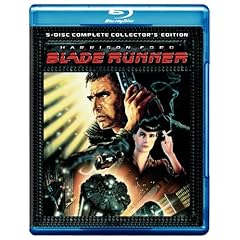 That's how it was released on VHS too, which is where I first saw it, but by the time DVDs came out, they took the narration back out and released a "Director's Cut" (misnamed as Ridley Scott didn't prepare it), and for many, many years, that's all that was available. The original theatrical edition had been expurgated from the record. They no longer aired it on TV and you couldn't buy it unless you found an old VHS copy around.
That's how it was released on VHS too, which is where I first saw it, but by the time DVDs came out, they took the narration back out and released a "Director's Cut" (misnamed as Ridley Scott didn't prepare it), and for many, many years, that's all that was available. The original theatrical edition had been expurgated from the record. They no longer aired it on TV and you couldn't buy it unless you found an old VHS copy around.For years I was curious about the voiceovers I'd seen once but couldn't remember. What was so bad about them? I was willing to accept that the movie was better without them (I certainly never felt like it was lacking anything) but I still wished I could compare. And with last year's five-disc Blu-Ray edition I finally could: for the first time in decades the original theatrical release, with voiceovers, is available.
Yesterday during my final swine flu sick day I watched it, and the first thing to strike me is that there aren't that many voiceover lines. Maybe ten in the whole movie. While they don't add anything beside explanations that aren't needed, they don't really detract, either. I didn't feel the movie was particularly better with or without them. By the law of subtraction (if you can do without something you should) they ought to be removed, but it doesn't seem like a big deal that someone should take such a fierce stand about. Expurgating that version is a vast overreaction.
(Spoiler warning for the following paragraph.)
With one glaring exception. At the very end, there's a voiceover that completely cheats to give us an unearned happy ending. Deckard reveals, out of the blue, that for no adequately explained reason and in complete contradiction to everything the movie established earlier, Rachelle is a "special" model with an unlimited lifespan. That line needs to go. Deckard survived and got out with Rachelle, and that's enough happy ending for this movie.

 RealTime and RTC
RealTime and RTC Prism
Prism Uncreated
Uncreated Bloodweavers
Bloodweavers Foulspawner's Legacy
Foulspawner's Legacy Lusternia
Lusternia
4 comments:
A couple years ago, well before the multi-disc ultimate edition was announced, Sci-Fi aired the original cut of the film, complete with voiceovers and happy, sunny ending. It threw me for a loop to surf by and see Deckard's spinner flying over a sunny meadow.
I must have missed hearing about that airing.
The sunny final shot is in the "director's cut" though (it's actually an unused clip from "The Shining" oddly enough). They always were meant to escape... just to the same fate that the other runaways had. Less than four years, and someone coming after them. That's the happiest ending this world can provide, and it's not that great. "It's a shame she won't live."
It's only the voiceover that changes that to something that doesn't fit.
The sunny scene is in the director's cut?
I've only ever seen the version that ends right as Deckard and Rachael enter the elevator, cutting to the credits.
Sounds like more revisionism is at work.
I don't recall ever seeing one without it... it's definitely in the director's cut I've always had and in the original theatrical edition, so I'm not sure which other one might not have it. But there are a lot of versions.
Post a Comment